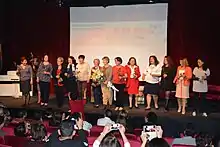Tunisian Association of Democratic Women
The Tunisian Association of Democratic Women (L'Association tunisienne des femmes démocrates (ATFD)) is a Tunisian feminist association which was founded in 1989.
| Founded | August 6 |
|---|---|
| Type | human rights organization |
| Location |
|
| Origins | Debating circle within the Tahar- Haddad cultural Club |
Area served | Tunesia |
Key people | Yosra Frawes and Neila Zoghlami |
History
In the 1970s and 1980s, a group of Tunisian intellectuals formed a debating circle around feminist topics in the Tahar-Haddad cultural club with the support of Jalila Hafsia.[1][2]
The Tunisian Association of Democratic Women was officially founded on the 6th of August 1989. It is an independent organization that criticises muslim influences on society, a lack of democracy and violations of women's rights. It judges the development on women's rights in Tunisia according to international standards like the Convention on the Elimination of All Forms of Discrimination Against Women. Tunisia did advance earlier in granting women more rights. For example through the Code of Personal Status in Tunisia which was established after the declaration of independence in 1956 which was a breakthrough in women's rights.

In 1993, the association opened up a counseling center for female victims of violence. In 2004, the association was one of initiators behind the initiative of the sexual harassment law in Tunisia. The organization also played an important rule in the Tunisian revolution in 2011. They fought to have election lists that keep gender quotas in mind for the Constituent Assembly of Tunisia. They always lobbied to have gender equality be put into all new laws.[3]
In 2008, the association won the Prize for human rights of the Republic of France (Prix des droits de l'Homme de la République française).[4] In 2012, it was awarded with the Simone de Beauvoir Prize (Prix Simone de Beauvoir pout la libterté des femmes).[5]
Presidents of the Association
One of the presidents of the association was the sociologist Khadija Chérif, who was formerly the secretary general of the International Federation for Human Rights in which l'ATFD is also a member. Another president was Ahlem Belhadj, who is the head of child psychiatry at the hospital of Tunis. Furthermore the lawyer Bochra Belhaj Hmida was a president and also the law professor Sana Ben Achour. Safia Farhat, who is a pioneer in visual arts in Tunisia was also heading the organization. The medical professor Habiba Zéhi Ben Romdhane was president of the association.[3] Others included the pediatrician Saïda Rached, the law professor Monia Ben Jemia and the lawyer Yosra Frawes,.[6][7]
References
- Evelyne Accad (2017). Blessures des mots. Journal de Tunisie - Wounding Words. A Woman's Journal in Tunisia (édition bilingue) (in French and English). Paris: L'Harmattan. p. 10. ISBN 978-2-140-02562-4.
- Monique Ayoun; Malika Boussouf (2014). Musulmanes et laïques en révolte (in French). Paris: Hugo & Cie. p. 149. ISBN 978-2-755-61416-9.
- Idels, Michèle (2013). "Association tunisienne des femmes démocrates (ATFD)". In Béatrice Didier; Antoinette Fouque; Mireille Calle-Gruber (eds.). Le Dictionnaire universel des créatrices (in French). Paris: Éditions des femmes. p. 295. ISBN 978-2-721-00651-6.
- "Droits de l'Homme: la France honore des ONG du Maroc, Tunisie, Liban". Jeune Afrique (in French). 2008. ISSN 1950-1285.
- "L'Association tunisienne des femmes démocrates reçoit le prix Simone de Beauvoir 2012". Le Monde (in French). 2012. ISSN 0395-2037.
- "Monia Ben Jémia élue présidente de l'Association tunisienne des femmes démocrates". radioexpressfm.com (in French). January 1, 2016. Retrieved December 2, 2017.
- Frida Dahmani (April 18, 2018). "Tunisie : qui est Yosra Frawes, la nouvelle présidente de l'Association des femmes démocrates ?". jeuneafrique.com (in French). Retrieved April 19, 2018.